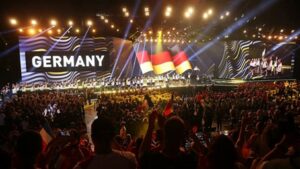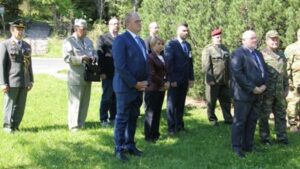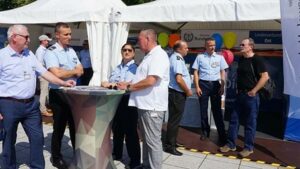Newsletter from Deutscher BundeswehrVerband (DBwV)
We need a Veterans Day!
Strengthening veterans’ culture and policy in Germany is one of the goals the German Armed Forces Association is committed to. A clear demand could soon be implemented.
In the past year and a half, Lieutenant Colonel (G) Marcel Bohnert has invited important multipliers from the veterans’ movement to workshops three times, most recently even in the rooms of the German Bundestag. Each time, the meetings were a gain: the participants exchanged ideas, reported on their own activities, problems and ideas to advance the topic. “Everyone was and is aware that it is up to us. We have to stay on the topic and become active,” says Bohnert, who is responsible for the topic as deputy to the DBwV national chair. Particularly because of the upcoming Invictus Games, the participants in society, the ministry and politics had felt a tailwind for their concerns. The meetings with veterans and wounded soldiers also resulted in a book that will be published in early September by the renowned Mittler-publishing house under the title “Deutschlands Veteranen – (Über)Leben nach dem Einsatz”.
 The veterans’ movement is still a grassroots movement in Germany; there are numerous initiatives, primarily by servicemen and women who have served in Afghanistan. “The framework conditions are still lacking for a genuine veterans’ culture anchored in society,” says Bohnert. In solidarity with younger veterans’ associations, Bohnert therefore launched another initiative last year: a flyer with joint demands to improve recognition and appreciation for veterans. “When it comes to a better perception for veterans, it is always also about a better perception for the military profession in general,” says Bohnert. Therefore, the concerns also affected all soldiers.
The veterans’ movement is still a grassroots movement in Germany; there are numerous initiatives, primarily by servicemen and women who have served in Afghanistan. “The framework conditions are still lacking for a genuine veterans’ culture anchored in society,” says Bohnert. In solidarity with younger veterans’ associations, Bohnert therefore launched another initiative last year: a flyer with joint demands to improve recognition and appreciation for veterans. “When it comes to a better perception for veterans, it is always also about a better perception for the military profession in general,” says Bohnert. Therefore, the concerns also affected all soldiers.
One of the DBwV’s demands is currently making great strides: in autumn, a veterans’ office is to be opened in Berlin, which will serve, among other things, as a contact point for – primarily former – veterans. The project will start as a pilot and will be evaluated in a few years. “This is a big step forward. If the facility proves itself, it should be expanded to other cities,” says Bohnert.
Ideally from the middle of society
A clear demand that the German Armed Forces Association has been making for years is for the introduction of an annually recurring Veterans Day. Public events could bring veterans and society closer together on this day. “Ideally, this initiative comes from the middle of society and is not imposed from above,” says Bohnert. Thus, it would be appropriate if the introduction of such a day were pushed forward in the German Parliament. How could the day be organised? Bohnert: “Structures grow with time. It is important that a basis is finally created. We need a Veterans Day!” The date chosen is of secondary importance. A day that has a connection to the Invictus Games in Düsseldorf in September would be ideal. Just like many other representatives of the veterans’ movement, Bohnert now hopes that the Federal President, who will give the closing speech at the Invictus Games, will take up the issue and push it forward.
Brigade in Lithuania: Colonel Wüstner demands clear information
Two months ago, during a visit to his Lithuanian counterpart Arvydas Anušauskas, Federal Defence Minister Boris Pistorius (SPD) surprised the Lithuanians with the announcement: “Germany is prepared to permanently station a robust brigade in Lithuania.” Meanwhile, the plans are becoming more concrete. Inspector General Carsten Breuer specified the plan a few days ago during talks in Lithuania with President Gitanas Nauseda. “There is no blueprint for it, so we really have to go into depth, we really have to do it from scratch,” Breuer said.
Implementation phase from 2024
He said the planning process should be completed this year, with both states aiming to enter the implementation phase as early as 2024. “We will have a plan by the end of this quarter,” Breuer announced. That would be the end of September 2023. Lithuania’s army chief, General Valdemaras Rupsys, also stressed that his country’s political and military leadership had an interest in seeing the deployment happen as soon as possible. “The presence of German troops in Lithuania is particularly important to deter the enemy in the neighbourhood and to enable the forward defence of Lithuania,” he said.
The Ministry of Defence is now examining how the stationing of the German brigade can be implemented. In the week following Breuer’s visit to Lithuania, the ministry will hold further discussions on the realisation of the project. Politicians are to be informed about the state of affairs at the next meeting of the Defence Committee, after which there will also be further information on the project for the public. Already at the end of this year, the Ministry of Defence is to draw up organisational orders on the structure and realisation of the stationing of a brigade in Lithuania.
 Wüstner: “A certain amount of unrest”.
Wüstner: “A certain amount of unrest”.
Colonel André Wüstner, Chairman of the German Armed Forces Association, demands that the troops be informed about the plans as best as possible: “The troops view the planned stationing of a robust combat brigade with a certain degree of unease, especially because overstretching is becoming apparent in certain areas. In order to counteract this, information should be provided this quarter on the status of the planning for the stationing in Lithuania. Those who inform provide clarity. Those who do not do so give room for rumours and unrest. And we don’t need that in the current situation.”
We want to help shape the future!
At the end of August, the working group “Young DBwV” met at the Federal Office of the German Armed Forces Association. Fifteen soldiers came together to talk about the challenges and possibilities of the DBwV with regard to its young members and mandate holders.
Why are you a member of the German Armed Forces Association?
The participants had to deal with this and other questions during the two-day meeting of the Young DBwV. Many of the answers revolved around joint commitment and the feeling of being part of something bigger. So are young people not only interested in the cheapest mobile phone contract or the latest brand-name clothes of the promotion society’s partners after all? It certainly looks that way, because there was surprisingly little talk of these things when it came to the question of how the DBwV can also become more attractive for young members and mandate holders. Keywords such as: more co-determination, increased direct communication or more interactive and sporting offers were heard far more often. The message behind all these suggestions for improvement is: We want to help shape the future!
Winning new members with information and media presence
 Winning young members for voluntary work in the DBwV does not seem to be as great a challenge as was previously assumed. But why is it that fewer and fewer members can be won over for voluntary work? The conference participants’ answer to this very question is: in addition to the wide range of information from everyday business and private life, there is a lack of knowledge and information from the DBwV. Many members are unaware of the DBwV’s regular conferences and events.
Winning young members for voluntary work in the DBwV does not seem to be as great a challenge as was previously assumed. But why is it that fewer and fewer members can be won over for voluntary work? The conference participants’ answer to this very question is: in addition to the wide range of information from everyday business and private life, there is a lack of knowledge and information from the DBwV. Many members are unaware of the DBwV’s regular conferences and events.
“Only since I became a secretary in my comradeship by chance do I know that the German Armed Forces Association organises many conferences for its members,” reported one participant. Her appeal: More presence – more communication!
I want to be actively involved – also via social media
Other participants also reported that there is a lack of knowledge in the group about conferences and other events and how to register for them. Their proposed solution? The DBwV must seek direct contact with members, for example through social media.
“I would like to feel that I can actively participate. For example, through surveys on the DBwV’s social media channels. This gives us members the opportunity to express our opinions on issues and the association can better assess the mood within the comradeships,” said another participant. So is it ultimately the social media that can motivate young members to get more involved? At the very least, the association should not underestimate the role of these media. At a time when almost everyone owns a smartphone and uses it to communicate and obtain information, the German Armed Forces Association should increase its media presence. In addition, opportunities must be created so that new and old mandate holders can network better with each other. Learning from and with each other should be the motto.
The task for the future is therefore: to maintain even more contact with the individual members and to use the communication and information channels even more intensively to present the work of the DBwV.
This was a result of the meeting that the DBwV can be quite satisfied with; after all, it shows that there are many interested and motivated young members who merely want to be informed more about opportunities for involvement and to be more involved in events. And the participants also seemed confident: “I will tell my comrades about the conference; I know some who would certainly like to join the “Young DBwV” working group.”
We can only say: the more, the better!
Defence spending: Record budget for some, sleight of hand for others
The parliamentary summer recess is over – with the deliberations on the budget, life is returning to the German parliament. And controversy:  The heating law and the gloomy economic situation are not the only reasons for this; the defence budget is also a source of parliamentary controversy. Defence spending will total 51.8 billion euros in 2024, plus 19.17 billion euros from the special fund. More money than ever before, but is it enough in view of the enormous challenges?
The heating law and the gloomy economic situation are not the only reasons for this; the defence budget is also a source of parliamentary controversy. Defence spending will total 51.8 billion euros in 2024, plus 19.17 billion euros from the special fund. More money than ever before, but is it enough in view of the enormous challenges?
Colonel André Wüstner warned against a softening of the special assets. “If the special assets are restructured, then the focus will be on buying things that are currently needed – keyword: operating expenses – these are funds for spare parts, personnel, infrastructure, ammunition and many other things. But definitely not for the necessary number of battle tanks, infantry fighting vehicles or even aircraft or ships,” warned the Federal Chairman.
The DBwV is present at the Open Day at the Ministry of Defence
The German Armed Forces Association (DBwV) provided information about its work and goals on the Open Day at the Ministry of Defence in Berlin. The day after, all interested parties were also welcomed to visit the stand run by the Eastern Regional Association. There visitors also got an insight into the work of the DBwV’s Soldiers and Veterans Foundation. That weekend, the Federal Chancellery, the Federal Ministries and the Federal Press Office invited all interested citizens to the annual Open Day.
Honour to whom honour is due
 The sixth Invictus Games open in the Merkur-arena in Düsseldorf. It is the emotional start of a unique event. “The opening was bombastic,” says Lieutenant Colonel Lutz Meier, Western Regional Chairman of the German Armed Forces Association. He says the athletes made a good impression and his perception: “They were overjoyed”. And that is not deceptive, because on this evening they get the respect they deserve. You can feel it right at the top of the stands, the energy transfers from the stage to the whole hall, to every seat. Meier says: “That was a great event, the games can start well with that.”
The sixth Invictus Games open in the Merkur-arena in Düsseldorf. It is the emotional start of a unique event. “The opening was bombastic,” says Lieutenant Colonel Lutz Meier, Western Regional Chairman of the German Armed Forces Association. He says the athletes made a good impression and his perception: “They were overjoyed”. And that is not deceptive, because on this evening they get the respect they deserve. You can feel it right at the top of the stands, the energy transfers from the stage to the whole hall, to every seat. Meier says: “That was a great event, the games can start well with that.”
Conference in Slovakia: DBwV input on the topic of “Women in the Armed Forces”
 On September 7 and 8, DBwV’s Europe Officer and Treasurer, Captain (ret.) Jörg Greiffendorf, visited Slovakia for an international conference celebrating the 30th anniversary of the Slovak Armed Forces and their representation of interests. Also present was EUROMIL President Emmanuel Jacob, as the 30 years of EUROMIL membership was celebrated at the same time. Both days were dedicated to one overarching theme: How can the interests and rights of servicemen and women be protected?
On September 7 and 8, DBwV’s Europe Officer and Treasurer, Captain (ret.) Jörg Greiffendorf, visited Slovakia for an international conference celebrating the 30th anniversary of the Slovak Armed Forces and their representation of interests. Also present was EUROMIL President Emmanuel Jacob, as the 30 years of EUROMIL membership was celebrated at the same time. Both days were dedicated to one overarching theme: How can the interests and rights of servicemen and women be protected?
The conference offered many opportunities for exchange; in addition to the panel discussions, there were informal talks and the State Secretary of the Ministry of Defense of Slovakia was also present. “The hosts were very pleased that their conference was so well attended and that lively discussions were held everywhere,” reports Jörg Greiffendorf. “During my presentation on the current state of female soldiers in the Bundeswehr and in the DBwV, it became clear that many European countries are facing the same challenges. This naturally gives room for joint solutions, also within the framework of EUROMIL. Overall, it became clear to me during the other panels how well the Bundeswehr in general is already doing thanks to the DBwV’s commitment. Female association members are also always welcome to approach us to be involved in working groups and we welcome their participation in events.”
DBwV speaks at conference about its own commitment to women in the Armed Forces
On the second day, the discussion revolved around the interests of professional soldiers, former servicemen and women, and women in the armed forces. Jörg Greiffendorf gave a short input presentation on the latter for the participants. In it, he outlined the situation of German female soldiers from the historic Tanja Kreil verdict to the present day. Soberly and honestly, he provided insights into the hurdles women face in the National Armed Forces and how the DBwV is trying to reduce them.
Regular meetings of the female staff are intended to create the create space for exchange and accurately identify problems. In many laws to improve the conditions for female soldiers, such as the DBwV has played a direct role in many laws aimed at improving conditions for women Equal Opportunities for Women and Men Soldiers Act.


